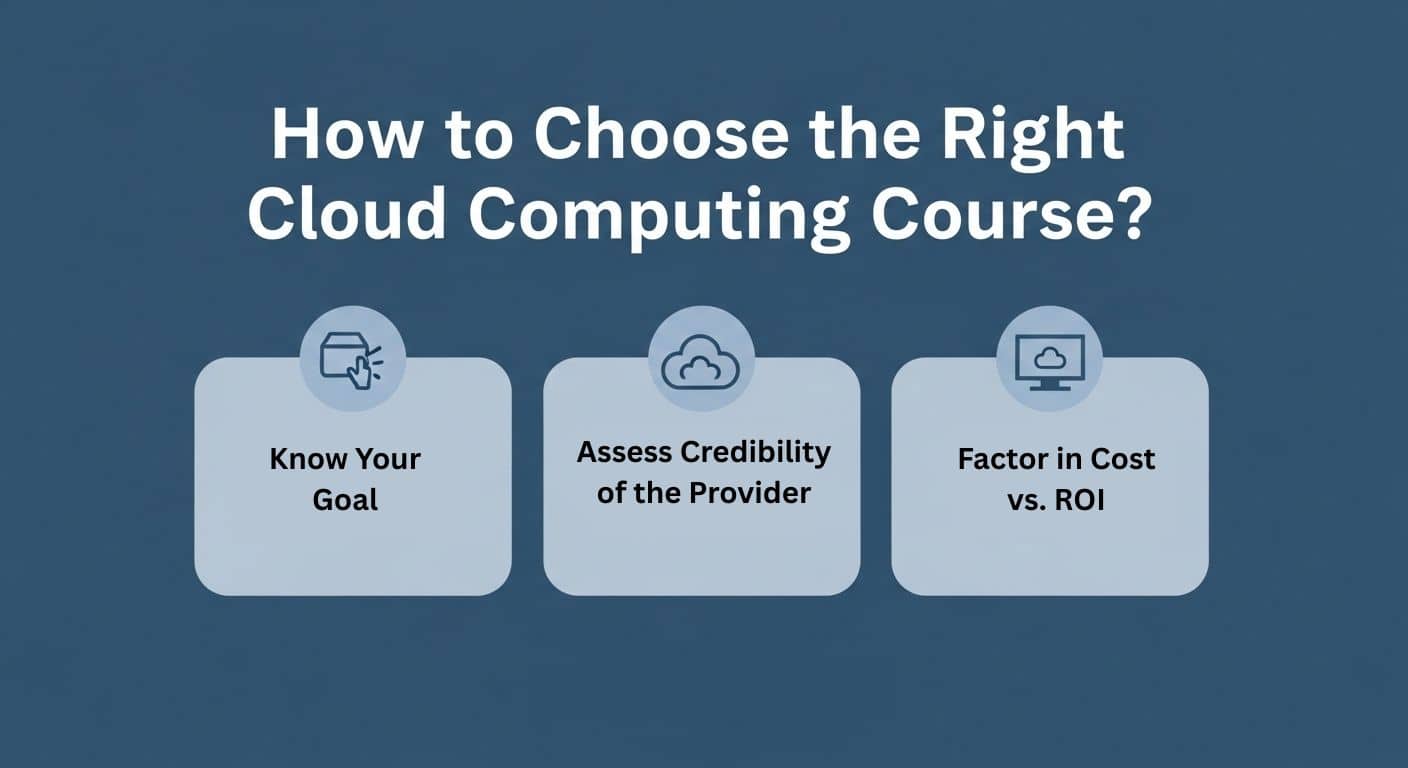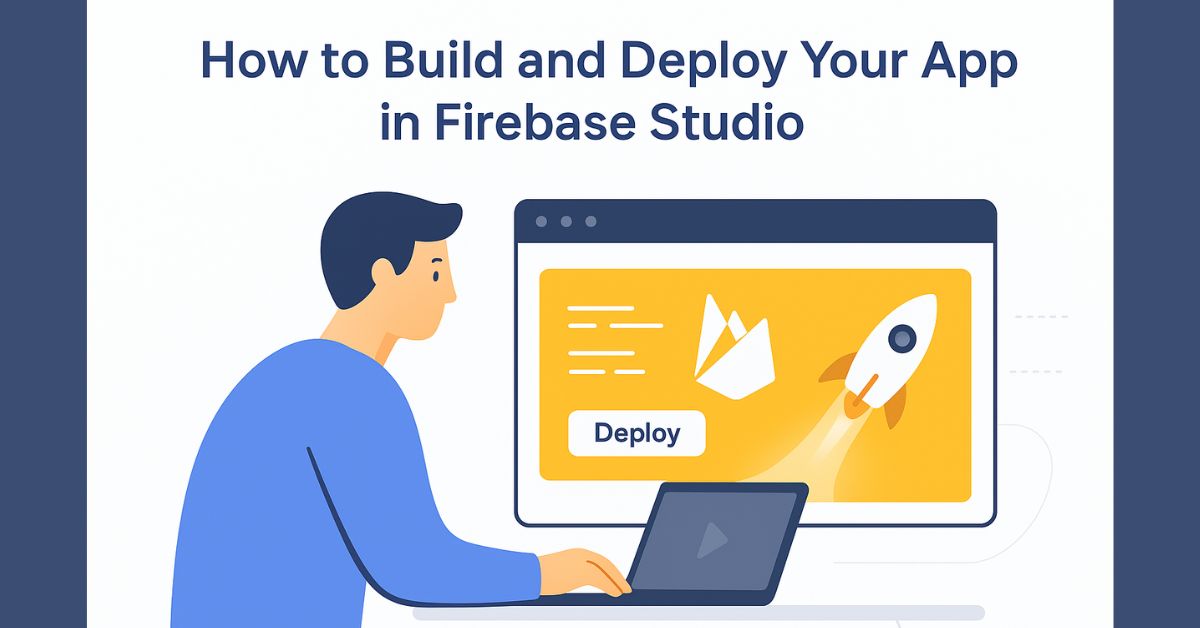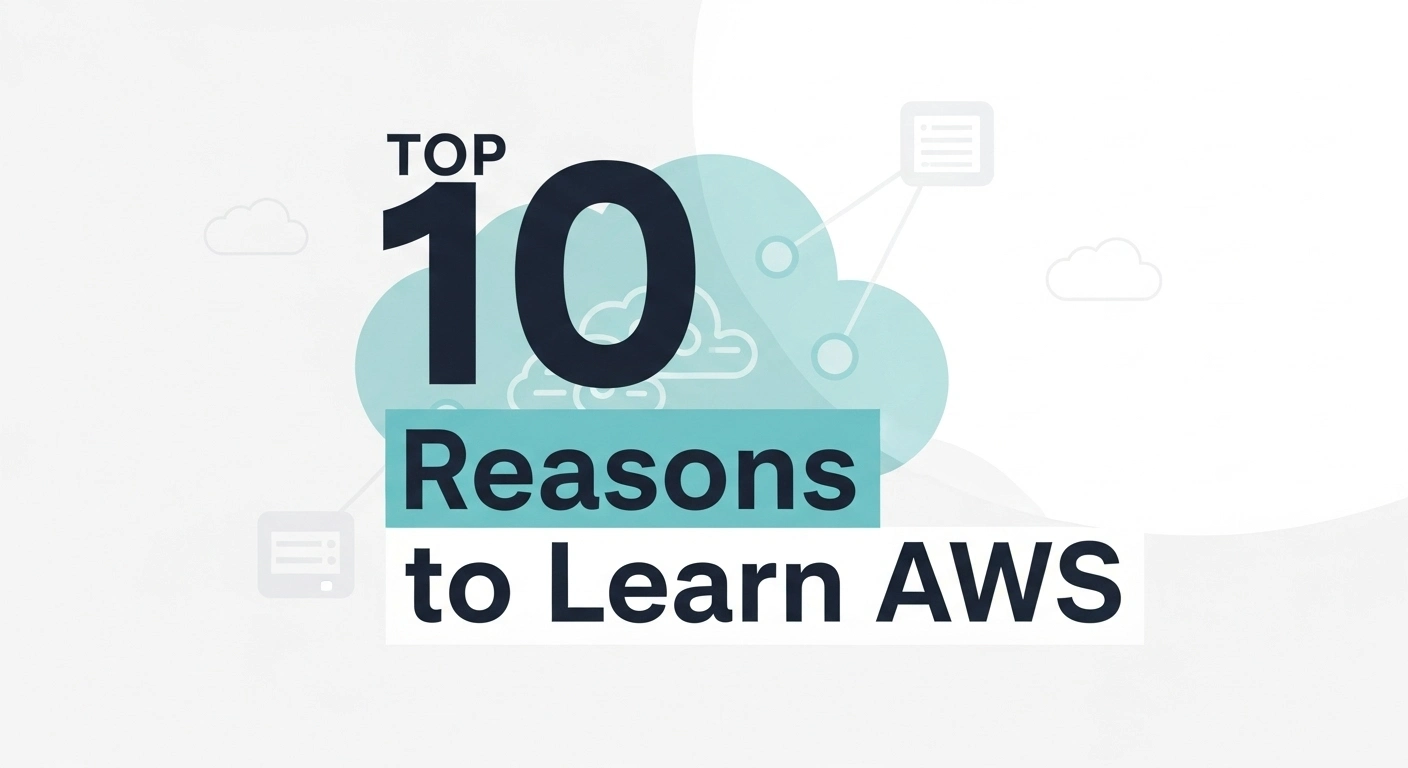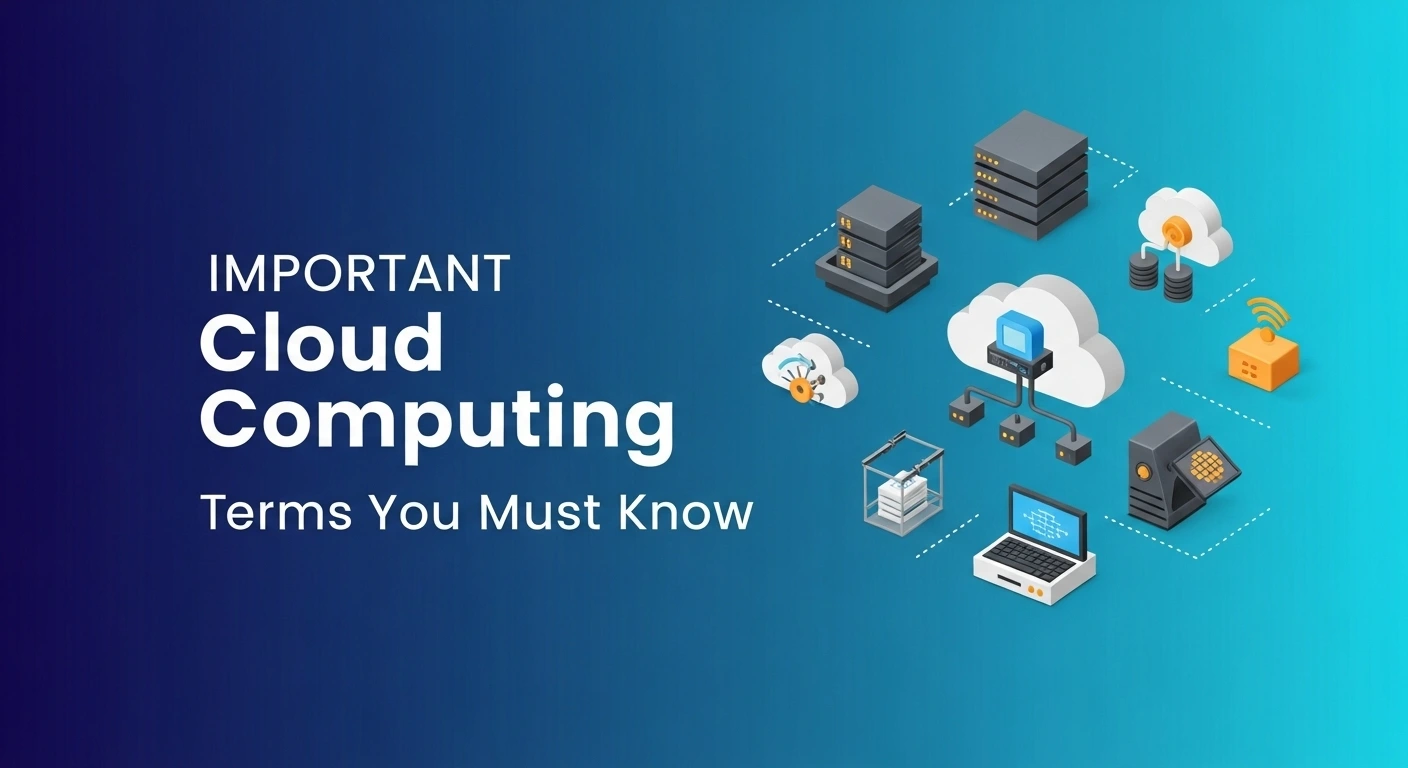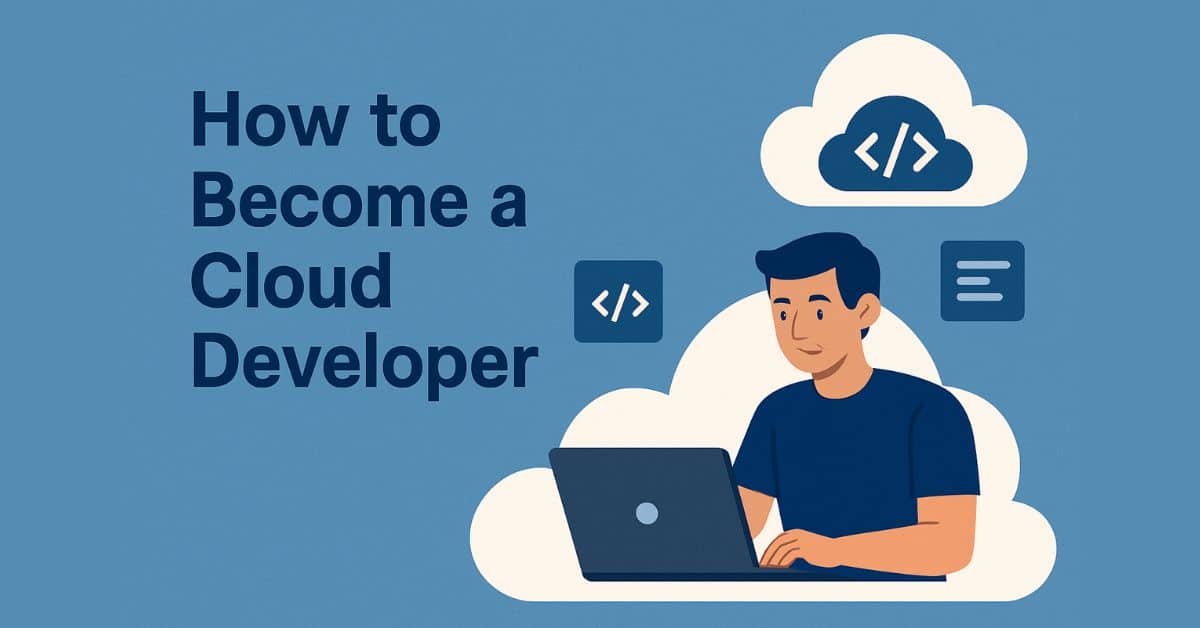- Know Your Goal: Define What You Want from the Course
- Check for Industry-Relevant Curriculum
- Evaluate the Course Format and Flexibility
- Assess Credibility of the Provider
- Consider Certification Value
- Look into Support and Community
- Factor in Cost vs. ROI
- Checklist Summary
- Frequently Asked Questions
- Conclusion
Cloud computing is no longer optional in today’s tech-driven workplace. But with hundreds of courses online, how do you choose the right one, especially as a working professional?
Cloud certifications and courses provide an excellent solution for working professionals who want to remain relevant or transition to new, higher-paying positions.
Nonetheless, when there are too many online courses, it is difficult to select one course. There is just not enough time, and not every learning process is the same. This is why the decision could be smarter and faster with the help of a targeted checklist, playing the role of working professionals.
This guide breaks down the key factors to evaluate and provides a simple, checklist-style approach so you can make a confident, career-focused decision, without wasting time or money.
Know Your Goal: Define What You Want from the Course
- Define Your Goal: Before enrolling, identify what you want to achieve, transitioning into a cloud-focused role (e.g., Cloud Engineer, Solutions Architect) or upskilling within your current role.
- Assess Certification Needs: Determine whether you need a certification (like AWS or Azure) for external validation or are primarily seeking hands-on skills for an internal application.
- Choose Based on Learning Outcome:
- For practical AWS skills: Courses like Hands-on AWS Cloud Training Essentials is ideal.
- For strategic, leadership-focused learning: Choose courses that emphasize cloud architecture, business strategy, and multi-cloud decision-making. Example: PG in Cloud Computing by the McCombs School of Business at the University of Texas at Austin.
- Explore Career Options First (If Unsure): If you’re uncertain about which path fits your interests, consult guides or blogs (e.g., How to Become a Cloud Developer) to explore roles, required skills, and course recommendations.
Check for Industry-Relevant Curriculum
A great cloud course should be practical, up-to-date, and aligned with industry roles.
What to Look For:
- Updated tech coverage: Includes serverless, Kubernetes, containers, and multi-cloud basics.
- Hands-on labs: Real cloud console experience > slides.
- Capstone or real-world projects: To build your portfolio.
- Role-focused structure:
- Cloud Architect → Platform-neutral, systems design focus
- DevOps Engineer → Infrastructure as Code, automation tools
- Developer → App deployment, CI/CD, serverless
Course Type Comparison
| Format | Best For | Pros | Watch Out For |
|---|---|---|---|
| Self-Paced | Busy professionals | Flexible, affordable | No live support or feedback |
| Instructor-Led | Those who need structure | Live sessions, Q&A | Less flexible with timing |
| Hybrid | Balanced learners | Flexibility + mentorship | May cost more |
Evaluate the Course Format and Flexibility
As a working professional, choosing a course that fits into your schedule is as important as the content. Here’s what to consider:
Course Delivery Mode:
Ideal if you need complete flexibility. You can learn on your own time, pause when needed, and revisit material. Check out the Azure Essentials course, which is fully self-paced, ideal if you need maximum scheduling freedom.
Timing of Live Sessions:
If the course includes live classes, check whether sessions are scheduled on weeknights or weekends, critical if you're balancing a full-time job. Also verify if recordings are available in case you miss a session or need to revisit a topic.
Duration and Intensity:
- Short-format courses (4 - 6 hours) are great for quick upskilling or tool-specific learning.
- Mid-length programs (4- 8 weeks) often provide deeper coverage, project work, and certification prep.
Choose a format that aligns with both your learning style and weekly availability to stay consistent and get the most out of the program.
Assess Credibility of the Provider
Choosing a credible course provider ensures you're learning from trusted sources and gaining skills that employers recognize. Here’s how to assess credibility:
- Instructor Expertise: Look into the qualifications and industry experience of the instructors.
- Platform Reputation: Check reviews, ratings, and learner feedback to gauge the trustworthiness and quality of the course provider.
- Affiliations: Look for partnerships with reputed universities or tech companies to ensure the course meets industry standards.
- Student Feedback & Success Stories: Look for reviews, testimonials, and LinkedIn profiles of past learners.
Consider Certification Value
- Prioritise Accredited Certifications: Select courses that lead to or align with recognized and accredited certifications for greater industry value.
- Differentiate Between Course Types: Some courses offer knowledge only, while others include formal exam preparation, mock tests, and even certification exam vouchers or discounts.
- Check Certification Renewal Policies: Be aware that many certifications require renewal every 2–3 years, understand the revalidation process before committing.
- Look for Exam Readiness Support: Choose a course that covers not just theory, but also exam strategy, practice applications, and real-world implementation skills.
- Aim for Practical Certification Outcomes: A well-rounded course should prepare you to both pass the exam and confidently apply your knowledge on the job.
Look into Support and Community
You will find the learning process easier when you are not doing it alone. Find out courses with active discussion forums, Slack or Discord communities where you will be able to find other peers, ask questions, and impart some new information.
- Ensure Easy Access to Doubt Resolution: Choose courses that offer support through instructors, teaching assistants, or dedicated mentors for timely doubt clarification.
- Leverage Peer and Mentor Interaction: Engaging with peers and mentors can significantly enhance your understanding and accelerate your learning.
- Look for Career Support Services: Some programs offer value-added services like resume reviews, job placement help, interview coaching, and employer connections.
- Consider Career Growth Opportunities: These career-focused extras are especially helpful if you're aiming for a job switch or promotion within your current organisation.
- Value a Strong Support System: A solid support network not only keeps you motivated but also bridges the gap between learning and real-world professional growth.
Factor in Cost vs. ROI
Not all expensive courses are better. And not all free ones are effective.
Ask:
- Is the cost justified by the content, mentorship, and certification help?
- Are there free trials, scholarships, or discounts?
- Does your employer offer reimbursement?
- What’s the time-to-ROI? A shorter course might lead to faster job-ready skills; a longer one may support leadership transitions.
Checklist Summary
Before choosing a cloud computing course, run through this working professional’s checklist:
- Have I defined my career or upskilling goal?
- Does the curriculum cover modern tools & roles?
- Is the course format flexible enough for my routine?
- Does it align with industry certifications?
- Is the provider reputable and reviewed?
- Is support available when I get stuck?
- Am I getting long-term ROI for the price?
This checklist ensures your learning path is focused, efficient, and aligned with real-world growth.
PG in Cloud Computing With AI Skills
Learn AWS, Azure & GCP with 80+ projects, 120+ services, expert mentorship & career support. Now with Applied AI on Cloud!
Frequently Asked Questions
Q1: Is certification necessary to get a cloud job?
Not always. Practical skills are usually sufficient when it comes to internal upskilling. However in the case of external recruitment, certifications assist in the verification of your knowledge.
Q2: Should I learn AWS, Azure, or GCP?
Begin by trying the platform that is most applicable in your industry. The most popular is AWS, Azure is the most prominent in enterprises, and GCP is gaining popularity in the sphere of data and ML.
Q3: Are free courses useful?
Yes, in basics. However, they usually have no project, structure, or mentorship. In the case of serious job moves, it can be better to use a well-designed course paid.
Read: Top Cloud Computing Projects
Q4: What if I’m not sure about my career path yet?
Begin with an introductory course in all three of the most popular cloud platforms and dive into such positions as Developer, Architect, DevOps, and Admin.
Conclusion
Choosing the right cloud computing course doesn’t have to be overwhelming. Regardless of your reskilling needs, upcoming promotion, or transition to a cloud-first job, your course must match your stage of career and your comfort learning style.
And don't forget that the best course is not the most expensive or the most broad one, but the course that fits your goals, availability and your aspirations. The checklist should be an effective means to save some time and energy.
